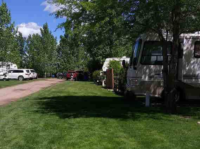LHA working with partners on shelter expansion
By Lethbridge Herald on February 20, 2024.
Al Beeber – LETHBRIDGE HERALD – abeeber@lethbridgeherald.com
Lost in last week’s announcement by the provincial government that it is funding an expansion of the Lethbridge shelter was the key new role being played in the facility by the Lethbridge Housing Association.
Along with the Alberta government and Blood Tribe Department of Health, the LHA is a partner in the initiative through an in-kind $1.4 million contribution of the property to it by the City of Lethbridge.
While the BTDH will continue to operate the shelter, which will see 125 new beds being added, the LHA will oversee the $4 million provincial capital grant.
The expansion, expected to be built on the same property as the existing facility, will increase capacity to more than 200 shelter spaces and at least 30 stabilization spaces, which LHA Chief Administrator Officer Robin James says is an important element of the pathway to recovery for those experiencing addictions and homelessness.
“With this funding we’re able to expand and enhance the shelter facilities, ensuring every guest who walks through the door is met with dignity, respect and the tools they need to rebuild their lives,” says James.
“In the spirit of collaboration, we have the power to elevate individuals to their highest level of independence. By coming together we create a supportive environment that fosters growth, resilience and empowerment. This collaboration is not just about bricks and mortar; it’s about building a community where everyone has the opportunity to thrive,” says James.
“By combining our strengths, the Government of Alberta, LHA and BTDH are poised to create a model shelter that exemplifies excellences, empathy and effectiveness in addressing homelessness.”
The expansion, says James, will have several advantages for the community. In addition to more sleeping capacity, the shelter will be able to offer more space for physical and mental health supports, addiction recovery programs, life skill pathways – ID clinic and space for partners to provide day or evening programs.
It will also provide space for the homeless to be engaged for case management and for helping them reach their highest level of independence, says James.
“We have purchased the shelter from the City of Lethbridge so the City has done an in-kind donation, an in-kind investment with the province for the purchase of the shelter. Lethbridge Housing now owns the shelter and we’ll be using the grant from Minister Nixon to expand not only the size of the shelter but the ability for it to have meaningful daily activities and support services” in the shelter itself, says the CAO, referring to Jason Nixon, Minister of Seniors, Community and Social Services.
Individuals coming into homelessness don’t have bank accounts, identification or stable income, says James, and right now the shelter is so cramped for space it doesn’t have the ability to facilitate programming on site.
Some day staff at the shelter are doing programming but they have to take people to the I.D. clinic and elsewhere.
“If we expand that space where people have the ability to stay at the shelter and do some day programming, maybe have an I.D. clinic, actually bringing services into the shelter.
An I.D. clinic provides assistance to homeless, at-risk individuals and recently housed Albertans in obtaining identification and Alberta personal health cards.
“The idea is to keep the services surrounding the folks that are there so they’re getting the services they need on the site so we can start transitioning them into housing” without taking them to a variety of places, adds James.
With LHA taking over the community based organization from the province, every other week there is a meeting with about 35 partners offering different services and one-by-one they are able to triage people who are presently facing homelessness, she says.
The BTDH has so far provided 117 referrals to addictions recovery services in their stabilization beds, says James.
“They’re doing remarkable work.”
The idea is that once people are brought into a recovery-oriented service and they have I.D., and they are ready for some type of income “then we’re able to stabilize them and get them housed through this pathway. So what the goal will be with the expanded shelter will be the ability to create pathways within the shelter system at the Lethbridge shelter, says James.
In Lethbridge people aren’t seen falling into homelessness simply because of financial barriers but rather because they suffer from addictions or mental illnesses or both, says James.
“So if we can start at the root of why are they addicted, can we get their mental health stable, then we can start addressing the housing piece with it.
“So having the Blood Tribe Department of Health specifically taking care of those individuals, it keeps that focus where it needs to be to start that triage within our system. Because what we don’t want is people trapped in homelessness.”
A short distance away will be a new LHA facility for people on a recovery pathway who need extra supports to stay housed, people who perhaps don’t have the capacity to cook and clean for themselves. That facility will keep them housed while giving them food security and addictions and mental health supports.
Last year, LHA signed a funding agreement with the province for a new $10.2 million, 42-bed supportive housing project on Stafford Drive North.
LHA has support workers to help those who hit the shelter because of financial barriers and can get them out of that situation quickly, says James, staff who deal with evictions prevention.
For addictions or mental health issues, the BTDH has 30 stabilization beds at the shelter so people can either move into either detox or a treatment facility from there, adds James.
Getting people to a facility can take time, James says, so people can utilize those stabilization beds at the shelter which has Alberta Health Services addictions/mental staff on site providing all the services they need to stabilize until a bed is ready, she adds.
“So we’re finally creating a system and a pathway for people in our city.”
30-29





This sounds like some well-considered, pragmatic, and cooperative engagement to respond to this dire and complex issue. Respect to all for this undertaking. Even small successes will mean great wins. Kudos.
Wonderful news!